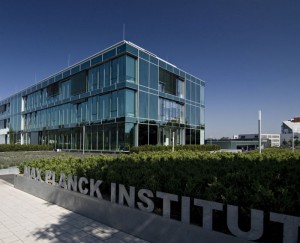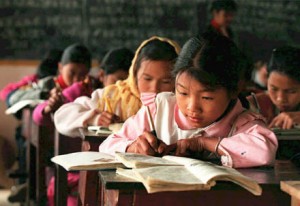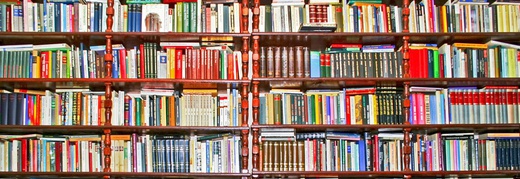The views expressed in our content reflect individual perspectives and do not represent the authoritative views of the Baha'i Faith.
Baha’u’llah, the Founder of the Baha’i Faith, wrote in the late 19th century that each individual should be regarded as
…a mine rich in gems of inestimable value. Education can, alone, cause it to reveal its treasures, and enable mankind to benefit therefrom.

Max Planck Institute
Recent infant studies at Harvard and Yale, cited in the Smithsonian and in the New York Times, confirm German studies conducted at the Max Planck Institute decades prior. Dominance of the egoistic self is not a given. Most of us are born, rather, as innate altruists. Provided the opportunity, toddlers will sacrifice their own comfort to help others. Even six-month old babies will identify with the helping puppet over the violent bully.
To the extent that they were reinforced early in life, these peaceable tendencies followed the children studied into adulthood. Separate studies at Dartmouth and Humboldt Universities over the past decade confirmed the importance of role models and early childhood experiences in determining the subject’s capacity to turn even traumatic experiences into transcendent, compassionate service and altruism as a way of life. Service had replaced fear for many responders. Research underscores the value of peacemaking skills as an aspect of early childhood education, to nurture the noblest aspects of human nature.
The writings of one of the Baha’i central figures, Abdu’l-Baha, a great humanitarian, peacemaker and advocate of educational equity, recommended:
I charge you all that each one of you concentrate all the thoughts of your heart on love and unity. When a thought of war comes, oppose it by a stronger thought of peace. A thought of hatred must be destroyed by a more powerful thought of love. – Abdu’l-Baha, Paris Talks, pp. 29
Shaping thought begins with our earliest conceptions of the most empathic responses to others and of the most optimistic responses to the challenges that relationships impose. Abdu’l-Baha knew the importance of instilling a radiant response to hardship in childhood.
Taunted and exiled for his own good works, Abdu’l-Baha taught by example the messages of a faith that relates the social principles such as peacemaking with universal education and equity (whether based on socio-economics, culture or gender). Among countless other humanitarian endeavors, he went into the schools each afternoon and tutored the children who had persecuted his family for their beliefs. After he passed away in 1921, many of the Baha’is who came after him, have served in the field of education, even in the most remote enclaves in the world, as a means of establishing a more harmonious society as well as helping each community discover ways to improve the wellbeing of its own people.
Baha’i-inspired education projects continue to spring up in many locations around the globe. Components of such educational models, even at the preschool age, usually include the proactive teaching of consultation skills, the development of patience and other positive character traits, mastery of the ego, behavior management strategies that encourage forgiveness or nonviolent approaches to conflict, and projects that help students unite with other children to apply their skills toward a common goal. In some regions, students complete practical service in their communities as they also hone their spiritual strengths. In these school settings, the concept of education as a long-term antidote for violence prevention becomes an organic process rather than a buzzword.

Classroom in Yunnan, China
The Baha’i Faith teaches the importance of universal education—that in this era, every child has a right to be educated, and that we should assist those in parts of the world where this goal proves challenging. Where parents must make a choice, the Faith’s founder taught that educating a daughter is an even higher priority than educating a son, for the mother will most likely be the one to educate her children and influence her society.
Recent United Nations statistics on the shifts in mortality rates, the standard of living, and general health have vastly improved in the past decade due to the increased education of girls and women. Their greater influence also has had an impact on the empowerment of girls and women as leaders and activists for peaceful causes. If education can produce such a profound effect where material means are few, surely it can instill social skills and problem-solving proclivities in children with technological advantages, growing up in a well-developed nation, with greater access to information tools, well-educated teachers and, by and large, literate parents with both spiritual and community resources to draw upon.
Today, we design policies and plans to make assault weapons less available and to reverse the culture of violence in the United States. Over time, with effective early childhood education, young people may increasingly grow up to spend their time designing innovative policies that enhance the wellbeing of others, in cities where violence is no longer the greatest challenge. These children are polished stones, who may build walls less obstructive and more decorous than we can envisage from our vantage point in history. May they teach the older generations to truly replace hate with a stronger thought of love.

















Comments
Sign in or create an account
Continue with Facebookor